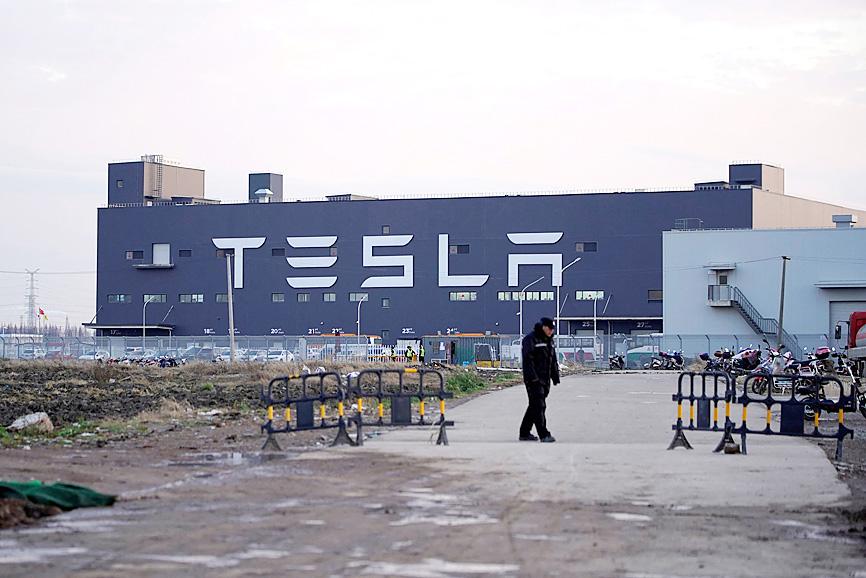Tesla Inc’s deliveries of electric vehicles fell in the second quarter of this year compared with the first quarter due mainly to a weeks-long closure of its factory in China, the company said on Saturday.
Tesla delivered 254,695 vehicles from April to last month, it said in a statement.
That was 27 percent more than in the first quarter of last year, but down 18 percent from the January-to-March quarter and the first such decline in more than two years.

Photo: Reuters
This marks a disappointment for a company that says it is posting strong growth, touting the opening of two new factories this year, in Germany and Texas.
The drop in deliveries was bigger than anticipated by analysts, who had expected 264,000 vehicles to be handed over to buyers, data compiled by FactSet Research Systems Inc showed.
Tesla in April said that supply chain snarls hitting the auto industry in general would keep disrupting the company’s production until the end of the year.
However, it delivered a record number of vehicles in the first quarter.
In the second quarter, Tesla had to grapple with the closure of its Shanghai factory for several weeks because of strict lockdown measures due to a surge in COVID-19 cases.
In its statement on Saturday, the company said it produced 258,000 vehicles in the second quarter, “despite ongoing supply chain challenges and factory shutdowns beyond our control.”
It also said last month was the highest vehicle production month in Tesla’s history.
Elsewhere in the industry, General Motors Co (GM), Toyota Motor Corp and other automakers in the second quarter suffered a hit to US sales, as supply chain woes continued to crimp inventories, results released on Friday showed.
GM sold 582,401 vehicles in the three months ending Thursday, a drop of 15 percent from the same period last year.
The Michigan-based company said it is holding 95,000 partly built vehicles in need of components that it expects to deliver by the end of this year.
Meanwhile, Toyota reported sales of 531,105 vehicles over the same period, a drop of 23 percent compared with the second quarter of last year.
The Japanese firm also cited “ongoing inventory challenges” hindering its dealerships.

Intel Corp chief executive officer Lip-Bu Tan (陳立武) is expected to meet with Taiwanese suppliers next month in conjunction with the opening of the Computex Taipei trade show, supply chain sources said on Monday. The visit, the first for Tan to Taiwan since assuming his new post last month, would be aimed at enhancing Intel’s ties with suppliers in Taiwan as he attempts to help turn around the struggling US chipmaker, the sources said. Tan is to hold a banquet to celebrate Intel’s 40-year presence in Taiwan before Computex opens on May 20 and invite dozens of Taiwanese suppliers to exchange views

Application-specific integrated circuit designer Faraday Technology Corp (智原) yesterday said that although revenue this quarter would decline 30 percent from last quarter, it retained its full-year forecast of revenue growth of 100 percent. The company attributed the quarterly drop to a slowdown in customers’ production of chips using Faraday’s advanced packaging technology. The company is still confident about its revenue growth this year, given its strong “design-win” — or the projects it won to help customers design their chips, Faraday president Steve Wang (王國雍) told an online earnings conference. “The design-win this year is better than we expected. We believe we will win

Chizuko Kimura has become the first female sushi chef in the world to win a Michelin star, fulfilling a promise she made to her dying husband to continue his legacy. The 54-year-old Japanese chef regained the Michelin star her late husband, Shunei Kimura, won three years ago for their Sushi Shunei restaurant in Paris. For Shunei Kimura, the star was a dream come true. However, the joy was short-lived. He died from cancer just three months later in June 2022. He was 65. The following year, the restaurant in the heart of Montmartre lost its star rating. Chizuko Kimura insisted that the new star is still down

While China’s leaders use their economic and political might to fight US President Donald Trump’s trade war “to the end,” its army of social media soldiers are embarking on a more humorous campaign online. Trump’s tariff blitz has seen Washington and Beijing impose eye-watering duties on imports from the other, fanning a standoff between the economic superpowers that has sparked global recession fears and sent markets into a tailspin. Trump says his policy is a response to years of being “ripped off” by other countries and aims to bring manufacturing to the US, forcing companies to employ US workers. However, China’s online warriors